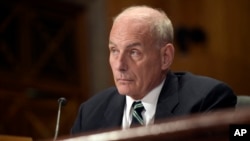President Donald Trump said recently he, not the officials who work for him, would make a final decision concerning the Obama-era executive order that protects from deportation more than 750,000 children of undocumented immigrants.
But Trump may have limited powers when it comes to a decision to end the Deferred Actions for Childhood Arrivals (DACA) program if a case is brought to the courts.
“When you take that fight to the court, it kind of takes it away from him [Trump], and the Department of Justice is in charge of defending DACA,” Denise McGettrick, a Texas attorney, told VOA.
In June, a group of 10 Republican state officials wrote a letter to Trump, urging the administration to terminate DACA and threatening to revive a lawsuit used to stop a 2014 executive order.
Court decision
Such a move would put the case back in front of U.S. District Judge Andrew Hanen for the Southern District of Texas. He presided over the lawsuit United States v. Texas and blocked a program that would have helped undocumented parents of Americans and young immigrants.
At this point, McGettrick said, Trump could decide to no longer defend the order, which would validate remarks made by Homeland Security Secretary John Kelly during a recent meeting with the Congressional Hispanic Caucus.
According to U.S. lawmakers present for the closed-door conversation, Kelly was questioned about the continuation of the DACA program.
“We were surprised. … Seems like he’s getting ready to implement actions against dreamers,” Congressman Adriano Espaillat of New York told VOA. "Dreamers" is a nickname given to people who entered the United States illegally as minors.
Espaillat said they “pushed really hard for dreamers” during the meeting, adding that it seems to indicate “he will unleash very heavy-handed action.”
Congressman Luis Gutierrez of Illinois said in a statement, “I think we have to prepare for the worst and get ready to fight mass deportation.”
Legal challenge
Kelly also told legislators that though he supports the program, he believes it would not stand up in court if the states go through with their legal challenge.
“Kelly was basically telling us DACA is facing a death sentence,” Gutierrez said. “They actually want to take millions of people who are documented — with our own government — make them undocumented, and then go after them and their families.”
Kelly said that it would be up to U.S. Attorney General Jeff Sessions, who is known for being a hard-liner on legal and unauthorized immigration, to make a decision on whether to defend DACA.
But Thursday, Trump said the decision about whether to challenge the program “is a decision that I make and it’s a decision that’s very, very hard to make.”
The president, while asserting his authority, did not commit to a yes or a no. “There are two sides of a story,” he said. “It’s always tough.”
The 10 Republican states gave the administration a deadline for a decision of September 5, the day members of Congress are expected to return from August recess.







